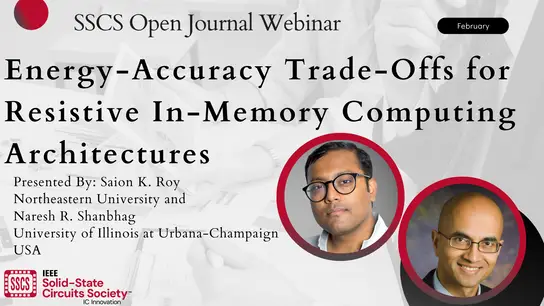-
Members: FreeSSCS
IEEE Members: $10.00
Non-members: $20.00Pages/Slides: 80
01 May 2021
Abstract- As applications become more data centric, the cost of accessing data from memory dominates energy and throughput. An emerging paradigm to address this is in-memory computing. Early approaches show the potential to reduce energy-delay product (EDP) by 2-to-3 orders of magnitude. However, architectures for enabling computation within the constrained structure of memory raise new challenges and opportunities. This tutorial will map out advances in these areas and examine recent demonstrations.
Bio - Naveen Verma received the B.A.Sc. degree in Electrical and Computer Engineering from the UBC, Vancouver, Canada, in 2003, and the M.S. and Ph.D. degrees in Electrical Engineering from MIT in 2005 and 2009, respectively. Since July 2009, he has been with the Department of Electrical Engineering at Princeton, where he is currently an Associate Professor. His research focuses on advanced sensing systems and on exploring how systems for learning, inference, and action planning can be enhanced by algorithms that exploit new sensing and computing technologies. This includes research on large-area, ?exible sensors, energy-ef?cient statistical-computing architectures and circuits, and machine-learning and statistical-signal-processing algorithms.
Bio - Naveen Verma received the B.A.Sc. degree in Electrical and Computer Engineering from the UBC, Vancouver, Canada, in 2003, and the M.S. and Ph.D. degrees in Electrical Engineering from MIT in 2005 and 2009, respectively. Since July 2009, he has been with the Department of Electrical Engineering at Princeton, where he is currently an Associate Professor. His research focuses on advanced sensing systems and on exploring how systems for learning, inference, and action planning can be enhanced by algorithms that exploit new sensing and computing technologies. This includes research on large-area, ?exible sensors, energy-ef?cient statistical-computing architectures and circuits, and machine-learning and statistical-signal-processing algorithms.
Primary Committee:
SSCS


